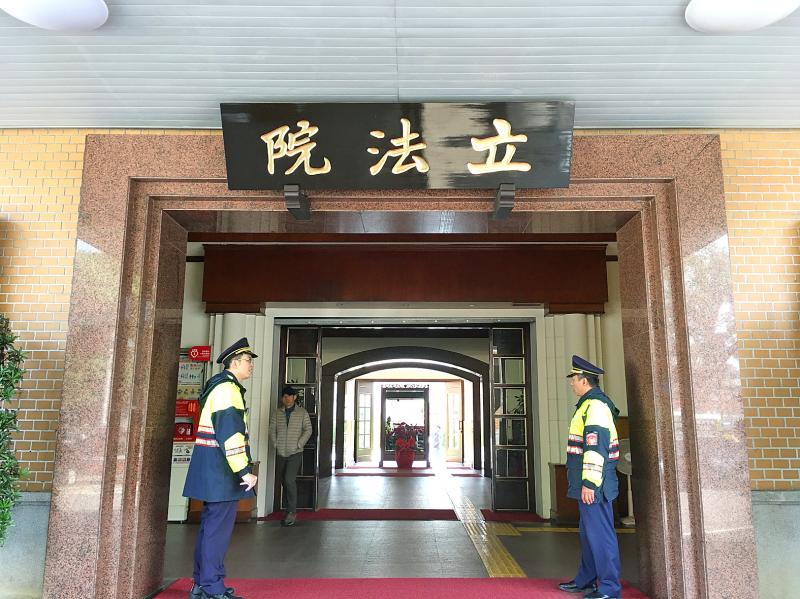A proposed legal amendment to close a three-month gap between Chinese citizens becoming naturalized Republic of China (ROC) citizens and renouncing their Chinese citizenship yesterday proceeded to committee review.
The proposal, sponsored by Democratic Progressive Party legislators Wu Ping-jui (吳秉叡) and Lin I-chin (林宜瑾), seeks to amend Article 17 of the Act Governing Relations Between the People of the Taiwan Area and the Mainland Area (台灣地區與大陸地區人民關係條例) by prohibiting Chinese citizens from obtaining ROC citizenship before they have provided documentation proving that they have renounced their Chinese citizenship.
Under existing rules, Chinese citizens can immediately proceed with household registration and apply for a National Identification Card once they have obtained a permanent resident certificate through marriage or special permits granted by the Ministry of the Interior.

Photo: Lin Liang-sheng, Taipei Times
The act’s accompanying guidelines on long-term and permanent residence stipulate that people who fail to provide documents proving that they have renounced their Chinese citizenship within three months of receiving a permanent resident permit would have their permit revoked.
The grace period creates a loophole in which some Chinese have dual nationality and dual household registration, resulting in a breach in the nation’s border controls, the lawmakers said.
The proposed amendment, if passed, would prohibit the National Immigration Agency from approving permanent residence certificates for Chinese citizens if they have not provided proof that they had renounced their original nationality.
A proposed amendment to the Nationality Act (國籍法), sponsored by DPP legislators Lai Pin-yu (賴品妤) and Ho Chih-wei (何志偉), that would ban Republic of China citizens with dual nationality from taking government positions also advanced to preliminary review.
Although rules are already in place to prevent people with dual nationality from serving as publicly elected delegates, the act remains at odds with the Civil Service Employment Act (公務人員任用法), resulting in Constitutional Interpretation No. 768, which states that people with dual nationality must not work as government-contracted physicians, Ho said.
As civil servants move up the ranks, their responsibilities could become more closely related to the nation’s interests, or make them privvy to sensitive intelligence, he said.
The proposal aims to safeguard national interests and secrets, he said.
Both proposals are to be reviewed by the Legislative Yuan’s Foreign Affairs and National Defense Committee and the Internal Administration Committee, Legislative Speaker You Si-kun (游錫堃) said.

The manufacture of the remaining 28 M1A2T Abrams tanks Taiwan purchased from the US has recently been completed, and they are expected to be delivered within the next one to two months, a source said yesterday. The Ministry of National Defense is arranging cargo ships to transport the tanks to Taiwan as soon as possible, said the source, who is familiar with the matter. The estimated arrival time ranges from late this month to early next month, the source said. The 28 Abrams tanks make up the third and final batch of a total of 108 tanks, valued at about NT$40.5 billion

Two Taiwanese prosecutors were questioned by Chinese security personnel at their hotel during a trip to China’s Henan Province this month, the Mainland Affairs Council (MAC) said yesterday. The officers had personal information on the prosecutors, including “when they were assigned to their posts, their work locations and job titles,” MAC Deputy Minister and spokesman Liang Wen-chieh (梁文傑) said. On top of asking about their agencies and positions, the officers also questioned the prosecutors about the Cross-Strait Joint Crime-Fighting and Judicial Mutual Assistance Agreement, a pact that serves as the framework for Taiwan-China cooperation on combating crime and providing judicial assistance, Liang

A group from the Taiwanese Designers in Australia association yesterday represented Taiwan at the Midsumma Pride March in Melbourne. The march, held in the St. Kilda suburb, is the city’s largest LGBTQIA+ parade and the flagship event of the annual Midsumma Festival. It attracted more than 45,000 spectators who supported the 400 groups and 10,000 marchers that participated this year, the association said. Taiwanese Designers said they organized a team to march for Taiwan this year, joining politicians, government agencies, professionals and community organizations in showing support for LGBTQIA+ people and diverse communities. As the first country in Asia to legalize same-sex

MOTIVES QUESTIONED The PLA considers Xi’s policies toward Taiwan to be driven by personal considerations rather than military assessment, the Epoch Times reports Chinese President Xi Jinping’s (習近平) latest purge of the Chinese People’s Liberation Army (PLA) leadership might have been prompted by the military’s opposition to plans of invading Taiwan, the Epoch Times said. The Chinese military opposes waging war against Taiwan by a large consensus, putting it at odds with Xi’s vision, the Falun Gong-affiliated daily said in a report on Thursday, citing anonymous sources with insight into the PLA’s inner workings. The opposition is not the opinion of a few generals, but a widely shared view among the PLA cadre, the Epoch Times cited them as saying. “Chinese forces know full well that